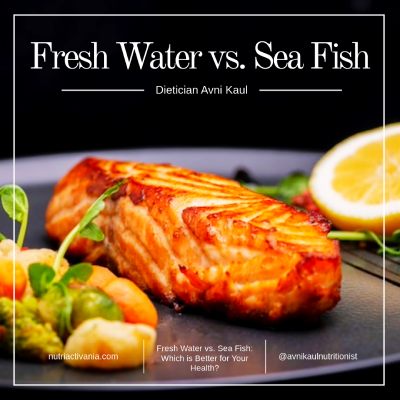India’s Top Dietician Avni Kaul Reveals the Truth
Fish is mostly hailed as a nutritious food choice due to its rich protein content and heart-healthy omega-3 fatty acids. However, the debate between freshwater and seafish continues to linger when it comes to health benefits. In this article, dietician Avni Kaul will explore the differences between freshwater and sea fish and discuss which option might be better for your health.

What is the Nutrient Profile?
Let us take a look at the nutrient profile for each of them:
Omega-3 Fatty Acids:
Sea Fish: Sea fish such as salmon, mackerel, and tuna, are renowned for their high omega-3 fatty acid content. Omega-3s offer numerous health benefits, including reducing the risk of heart disease, improving brain function, and reducing inflammation.
Freshwater Fish: While freshwater fish like trout and catfish also contain omega-3 fatty acids, they usually have lower levels than their sea counterparts.
Protein:
Both types of fish are excellent sources of high-quality protein, essential for muscle development and overall health.
What about the contaminants?
Contaminants could have a major role when one decides to eat fish. Some of them are below mentioned:
Sea Fish: Sea fish can be more prone to contaminants like mercury and polychlorinated biphenyls (PCBs) due to their larger size and longer lifespan. However, many countries have strict regulations and guidelines to monitor and limit these contaminants in seafood.
Freshwater Fish: Freshwater fish may have fewer contaminants due to their shorter lifespans and different feeding habits. However, it is crucial to check local water quality and advisories for specific lakes and rivers.
Taste and Culinary Versatility
The choice between freshwater and sea fish often comes down to personal preference. Sea fish tend to have a more distinct flavor due to their diet of smaller fish and marine organisms, while freshwater fish may have a milder taste. The culinary versatility of seafish is often praised for it’s ability to adapt to various cooking methods and cuisines.
Environmental Impact
Sea Fish: Overfishing and unsustainable fishing practices have threatened some sea fish populations. It is crucial to choose sustainable seafood options to help protect marine ecosystems and ensure future availability.
Freshwater Fish: Some freshwater fish populations are also at risk due to habitat destruction and pollution. Sustainable fishing practices are essential here as well.
Availability and Cost
Sea Fish: Depending on your location, sea-fish can be more readily available in coastal regions and urban areas. Sea fish tend to be more expensive than freshwater varieties due to their demand and the cost of fishing in deeper waters.
Freshwater Fish: Freshwater fish are often more accessible in inland regions and can be more affordable.
Both freshwater and sea fish have their unique qualities and health benefits. Sea fish are often praised for their higher omega-3 fatty acid content, distinct flavour, and culinary versatility. However, freshwater fish can also be a healthy choice, with lower contaminant levels and affordability.
Ultimately, the choice between freshwater and sea-fish should consider your personal taste preferences, dietary needs, and the sustainability of the fish source. Whichever you choose, prioritize purchasing from reputable sources that adhere to sustainable fishing practices and guidelines to ensure a healthy meal for both you and the planet.
- Amazing Indian Foods to Lower Your Blood Pressure Level Naturally - April 26, 2024
- Fruits That Can Help You Lose (or Maintain Your) Weight - April 23, 2024
- What are the Potential Health Benefits of Raw Sprouts? - April 20, 2024
